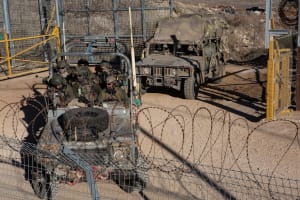May Day in Israel - Decline of the ‘Workers’ Day’ mirrors decline of socialist parties
Socialist holiday holds little significance for younger generations

May Day, once a widely observed holiday in Israel, has ceased to be a nationally significant holiday. The story of the decline of May Day mirrors the decline of the socialist parties in the Jewish nation, as issues of Zionism, security, and building the “Startup Nation” moved to the fore.
Originally imported from labor movements in the United States in the late 1800s, May Day found fertile ground in the emerging labor movement of Eastern European Jewish immigrants to the land during the Ottoman period.
During the early 20th century, as Jewish immigration surged, bringing many socialists from Eastern Europe, the May Day tradition came to the growing Jewish towns and cities, especially around Tel Aviv and Petah Tikvah.
During the Second Aliyah period [roughly 1904 until the British Mandate] there was a surge in May Day protests and demonstrations, reflecting the growing influence of socialist ideologies among Jewish settlers, which was also mirrored in the growth of the kibbutz movement.
Under the British Mandate, May Day became an established tradition, with large assemblies and parades. The formation of the Histadrut, a unified labor movement, further solidified May Day's importance, bringing nationwide celebrations by the 1930s, with tens of thousands participating in events across the country. The events often included both Jews and Arabs, although there were several violent incidents reported between the two groups during some of those celebrations.
However, the founding of the State of Israel in 1948 brought about changes that led to May Day's eventual decline.
Israel’s first leader, Prime Minister David Ben-Gurion, opted not to make it an official holiday, while also moving Israel’s foreign policy focus towards the West, signaling a shift away from socialist ideals. The onset of the Cold War, which saw Israel turn more toward the U.S. and Great Britain, while the Arabs and Palestinians sided with the USSR, further weakened the socialist movement in Israel, leading to a decline in May Day events.
The dramatic triumph of Israel during the Six-Day War of 1967, and the growth of the political right following the Yom Kippur War, brought a shift in Israeli society which began to make the socialism of yesteryear seem less important to the average Israeli.
Since the Yom Kippur War, socialist parties in Israel have declined significantly. In recent polls, two of Israel's primary socialist parties were in danger of failing to earn enough votes to achieve representation in the Knesset.
This decline in the socialist parties, and the celebration of the socialist-themed May Day, was only exacerbated by the relative collapse of political communism in the 1980s and ‘90s.
At the same time, the First Lebanon War, which saw the beginning of armed struggle on a national level over the Palestinian cause, the development of Hamas into a clear enemy, and the First Intifada, led to the growth of Zionism as a major force in Israeli society. Socialism and Zionism had never been clear partners before, and the commonalities between the socialist rhetoric and the often socialist-led Palestinian groups, such as the Palestinian Liberation Organization (PLO), led to a weakening of socialism as a political ideology in Israel.
A further cause of the decline of May Day in Israeli society is the use of the Hebrew calendar for establishing national holidays. Because the Hebrew calendar is based on a synchronization of the lunar and solar calendars, national holidays following the Hebrew calendar change their dates of observance in the Gregorian calendar.
In Israel, if any national holiday, of which there are several during late spring, falls on or near May 1, the national holiday is given preference.
Several important national holidays or memorial days take place during the late-April to mid-May timeframe, including Holocaust Remembrance Day, Independence Day, and Memorial Day. All of these have fallen on May 1 during Israel’s modern history, trumping the celebration of May Day.
Following the Second Intifada, as the country became even more Zionist and right-wing, and with the growth of the high-tech economy in Israel, fewer and fewer of the young generations in Israel have seen the importance of the labor movement and May Day.
Since the late 1990s, May Day celebrations in Israel have largely been sporadic, small-scale demonstrations or celebrations, often organized by the Histadrut – Israel's national labor union – and targeting youth. Businesses remain open as usual, unless a national holiday on the Hebrew calendar falls on the same day.
The rise and fall of May Day celebrations in Israel mirror the broader evolution of the nation's political and social landscape. While its heyday may be a thing of the past, its legacy as a reflection of the country’s socialist-influenced beginnings and transition to a more nationalist and religious society is an important part of Israeli history.

J. Micah Hancock is a current Master’s student at the Hebrew University, pursuing a degree in Jewish History. Previously, he studied Biblical studies and journalism in his B.A. in the United States. He joined All Israel News as a reporter in 2022, and currently lives near Jerusalem with his wife and children.
You might also like to read this:















